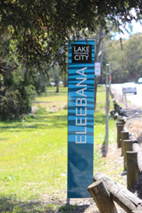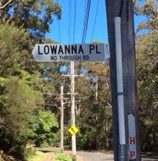TASMANIA Words: eleebana: emphasis, 'okay'
- Jeremy Steele

- Sep 6, 2025
- 5 min read
Updated: Jan 29
There is a place on Lake Macquarie, near Newcastle, in New South Wales, called Eleebana. Internet searches result in statements that it is an Aboriginal word meaning ‘place of beauty’. However, there is more to it than that.
Eleebana, Lake Macquarie, NSW Lowanna Place, Hornsby, NSW Tangara train, Sydney
Fig. 1 Tasmanian words out of place
‘Eleebana’ is not just an Aboriginal word, it is a Tasmanian Aboriginal word and so a long way out of place on Lake Macquarie. There were several dozen records, many of which, however, were duplicates or copies of earlier records, made of Tasmanian words including eleebana, or something like it. Given the fact that many of these were spelt in different ways, is is better to re-spell the word in a modern way, as ilibana. One such record was the following, and it is the only one with the word ‘beauty’ featured in the English translation of it:
Australian | respelt | English | EngJSM | source |
"Lowanna‑eleebanaleah" | luwana yilibanaliya | "Beauty (fine‑looking woman)" | woman okay-having | Curr 3,#A12a, Milligan, Oyster, Bay, [3:637:4.1] [OyB] [Tas] [1859] |
Fig. 2 ‘eleebana’ meaning ‘beauty’
In the modernised English translation (EngJSM, yellow column) it is shown as ‘okay’ rather than beauty. The other word in this example is luwana, and there is a Lowanna Place in Hornsby, NSW. This is the same word, spelt slightly differently, and is also a long way from Tasmania, where it is one of numerous words for ‘woman’, many of which begin with ‘l-’. In much of mainland Australia it is unusual for words to begin with either l- or r-; but in Tasmania, this does not apply. And why there might have been several words for ‘woman’ in Tasmania is perhaps because there were up to around a dozen languages somewhat related to one another once in common use on the island.
Tasmanian words for ‘go’ illustrate the multiplicity of languages (the ‘source’ column may show the region):
"tabelti" | dabildi | "Walk, to" | go | Curr 3,#A6,Lhotsky,[3:611.2:9] [SE] [Tas] [1835] |
"tapera" | da-bi-ra | "Come here" | go-come | Roth: vocabs [:10:11.2] [] [Tas] [1827-30] |
[taplaldy] | dabla-ldi | "[coethee plenty a big one you taplaldy weethicallee]" | go | Plomley gar [:39:35.11] [] [Tas] [c.1835] |
"Tableti" | dabli-di | "Walk (to)" | go | Lhotsky Tas [JRGeog:161.2:33] [OyB] [Tas] [1836] |
"[tablene]" | dabli-ni | "[{run}]" | go | Plomley gm [VDA:377:17.1] [NMid] [Tas] [1829] |
daga-nila | "where are you going?" | go thou [?] | Plomley cr [:239:39] [BLmd] [Tas] [c.1838] | |
"[tuck.er.par]" | daga-ba | "[do not go, don’t walk]" | go-no | Plomley cr [:239:41.2] [Nth] [Tas] [c.1838] |
"tackamoona" | daga-muna | "travel" | go xxx | Plomley mj [A610.mj:458:33] [OyB] [Tas] [1857] |
"Tackany" | daga-ni | "Go home" | go | Curr 3,#A10c,Jorgenson,Southern,[3:624:15.3] [SE] [Tas] [c.1835] |
"Tagara" | daga-ra | "walk" | go | Riche: Esperance & Recherche Tas 1793,[d.4:1:2] [SE] [Tas] [1793] |
"tag.ge.ner" | dagi-na | "come" | go | Plomley gar [:190:10] [NMid] [Tas] [c.1835] |
"tangara" | danga-ra | "{let us go away}" | go-come | Plomley dlf [RVL-P:238:41],[SE],[Tas],[1793] |
"tarrabilyie" | da-ra-bilyi | "come" | go | Plomley jd [A610.jj:190:25] [SW] [Tas] [c.1835] |
"tow.way" | dawa | "go well" | go | Plomley gar [:239:30] [] [Tas] [c.1835] |
"tawie" | dawi | "walk" | go | Plomley jd [A610.jj:459:12] [BRiv] [Tas] [c.1835] |
"ty.yer.lere" | da-ya-liya | "come" | go-come | Plomley gar [:190:38] [NE] [Tas] [c.1835] |
Fig. 3 The record highlighted in blue provided the name for Sydney's Tangara trains
However, we are looking at eleebana. As will soon be seen, -libana had two principal meanings, one being ‘okay’. But first, here is a list of other occurrences of it:
"wōllībbĕrnĕr" | wuli-bana | "Black beetle" | beetle | Roth: Norman, Rev. James Port Sorrell [:1:12.3] [Nth] [Tas] [1832-67] |
"lee.bun.ner" | liba-na | "like cranberry, on ‘firs’ (?)” | fruit | Plomley gar [:340:24] [OyB] [Tas] [c.1835] |
"Rowlebanna" | rali-bana | "Achilles Rowlebanna" | NAME OF PERSON | Ryan 1996,[::],[],[Tas],[1996] |
"LEEBUNNER" | libana | "NOY.HE.PUN.NET.TER: Waterhouse Point NOY.HE.NER: thunder; the natives call it the thunder LEEBUNNER or house, hence its name. …” | NAME OF PLACE | Plomley places [:48:6.3] [NE] [Tas] [1992] |
"lepanna" | liba-na | "throat" | neck | Plomley mjm [:58:25],[T-E],[Tas],[1857] |
"Lepäyna" | libanya | "throat [?]" | neck | Westlake, Ernest Notebooks [6:64:26],[],[],[c.1910] |
"le.bun.ner" | liba-na | "young shallot" | tuber | Plomley gar [:351:24] [SE] [Tas] [c.1835] |
Fig. 4 libana meaning ‘beetle’, ‘fruit’, neck’ and ‘tuber’, and used in names of people and places
There were many more examples of names of people and places featuring -libana than are shown in Fig. 4.
Apart from the above special uses, the main occurrences of -libana words showed what appear to be two principal meanings for it: okay, and as an emphatic, or applying emphasis, as when ‘very’ might be used. First the ‘emphasis’ uses:
"wugherinna rugotoleebana" | wugarinarugu dulibana | "fang (canine tooth)" | tooth lengthy EMPH | Plomley mj [A610.mj:110:33] [OyB] [Tas] [1857] |
"Rogoteleebana" | rugu dilibana | "Long" | lengthy-EMPH | Curr 3,#A12a, Milligan, Oyster, Bay,[3:654:15.1] [OyB] [Tas] [1859] |
"Mowatty nieleebana" | mawadi nilibana | "Ugly" | bad-EMPH | Curr 3,#A12a, Milligan,Oyster,Bay,[3:666:10.1] [OyB] [Tas] [1859] |
"ter.lang.ne.lib.ber.ner" | dalang nilibana | "plenty" | plenty-EMPH | Plomley gar [:358:19] [OyB] [Tas] [c.1835] |
"Ungoyeleebana" | ungu yilibana | "Straight" | straight-EMPH | Curr 3,#A12a, Milligan,Oyster,Bay,[3:663:4.1] [OyB] [Tas] [1859] |
"Nienta mena tuggararoot' eleebana" | ninda mina dagara rudilibana | "My sister is very tall" | sister me-of go lengthy-EMPH | Curr 3,#A,Joseph,Milligan,sentences,[3:671:13],[OyB],[Tas],[1859] |
Fig. 5 -libana as an emphatic. (Note that dagara in the last example occurs in the Fig.3 list of ‘go’ words)
The meanings for -ilibana in the examples in Fig. 5 are given as EMPH(asis), as suggested in the bottom example, ‘very tall’. Now compare them with the other meaning, ‘okay’:
"noya leebana" | nuya libana | "fragrant" | aroma-okay | Plomley mj [A610.mj:397:18] [OyB] [Tas] [1857] |
"Luggana eleebana" | lagana yilibana | "Foot (right)" | foot-okay [right] | Curr 3,#A12a, Milligan,Oyster,Bay,[3:647:17.1] [OyB] [Tas] [1859] |
"Leoonya eleebana" | liyunya yilibana | "Leg (right)" | leg-okay right | Curr 3,#A12a, Milligan,Oyster,Bay,[3:654:6.1] [OyB] [Tas] [1859] |
"Wughnna eleebana" | wugana yilibana | "Limp (see Lame) right foot" | lame-okay | Curr 3,#A12a, Milligan,Oyster,Bay,[3:654:10.1] [OyB] [Tas] [1859] |
"{Lian eleebana}" | liya nilibana | "{Fresh‑water}" | water-okay | Curr 3,#A,Joseph, Milligan,sentences,[3:671:28.1] [OyB] [Tas] [1859] |
"Lowana eleebana" | lawana yilibana | "This woman is very white" | woman-okay | Curr 3,#A,Joseph, Milligan,sentences,[3:672:4],[OyB],[Tas],[1859] |
Fig. 6: -libana with a positive, approving, meaning, tagged as ‘okay’
There appears to be an idea of approval running through the examples in Fig. 6. ‘Fragrant’ is a good smell, not a bad one, which would be ‘stink’. To be right-handed, as opposed to left-handed, is the dominant feature for people, and so is approved of. To be left-handed, in some European languages at least, is ‘sinister’. Fresh water is water that is approved of. And finally, for a woman to be ‘very white’, is both an emphatic statement, but also one of approval. Compare it with the same usage in Fig. 2, where the woman is ‘ beautiful’, and also to be approved of.
There is one other feature evident in the examples presented here, and that is the beginning of the -libana words dulibana, nilibana and yilibana. There could be some significance in the different initial consonant used in the examples, some variation in the shade of meaning indicated by the changing beginnings. On the other hand, the variations might be solely due to euphony, or what just sounded good and appropriate in the spoken language. It seems likely that we shall never know.
Jeremy Steele
6 September 2025







Comments